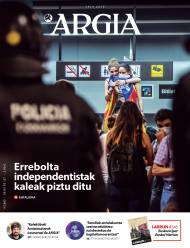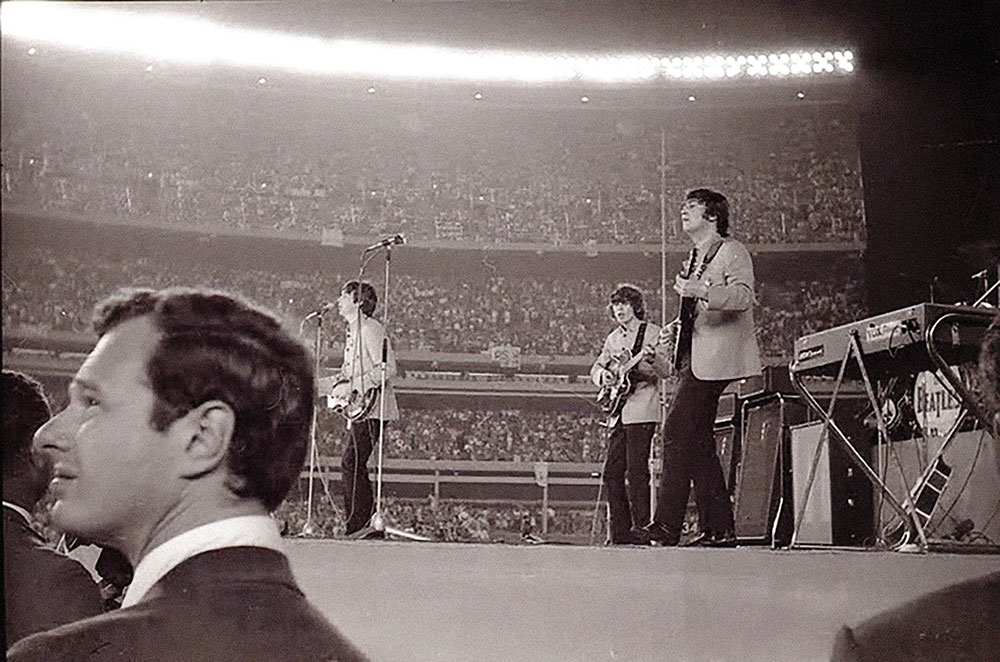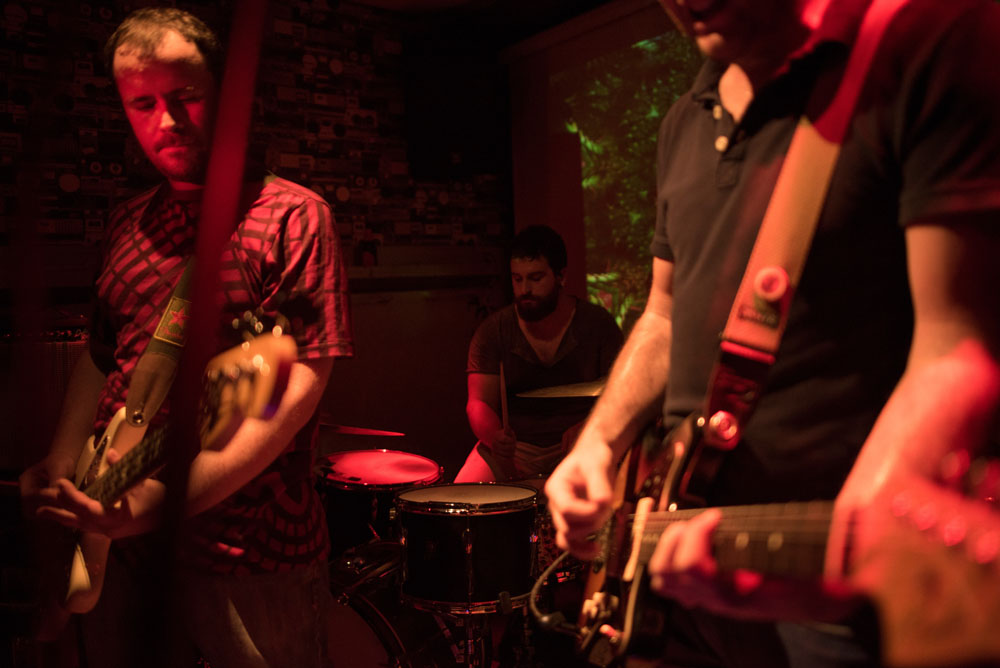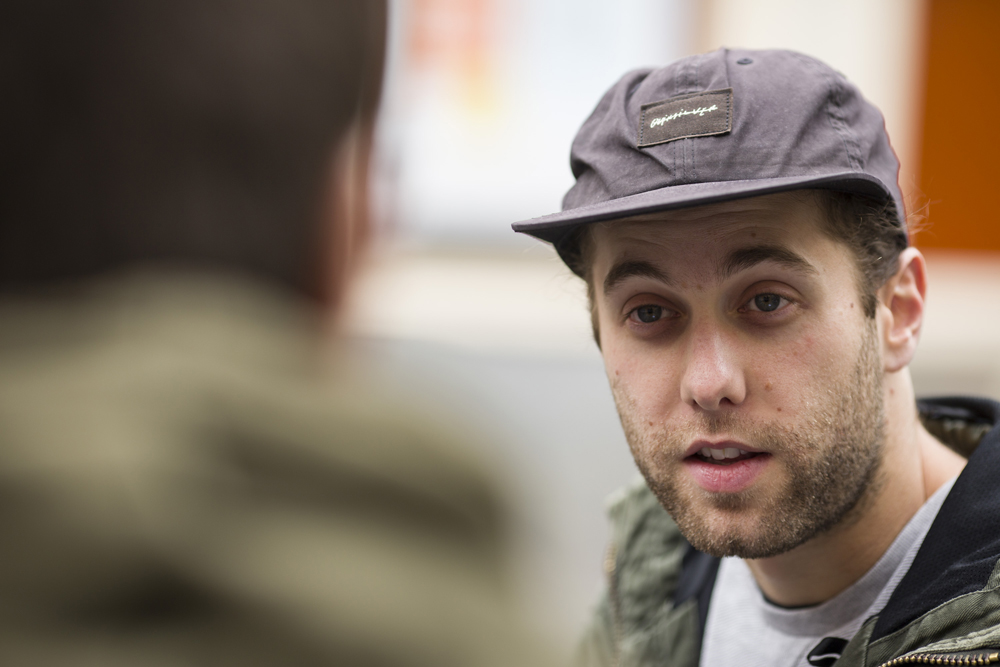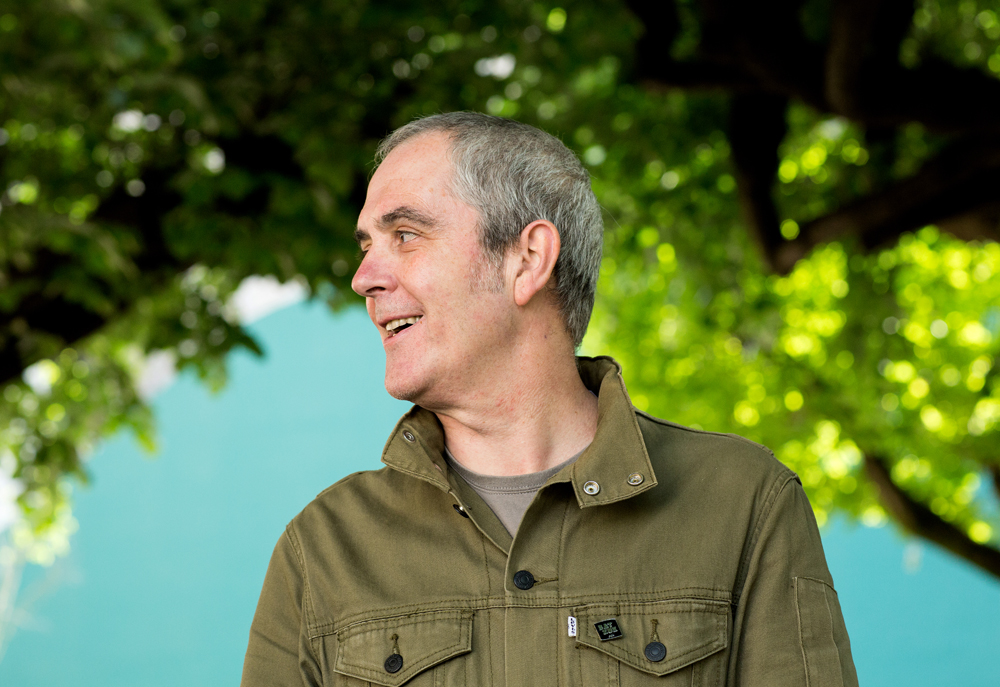"I have to risk, otherwise I don't exercise."
- It has been one of the souls of the Audience group for fifteen years. United teaching has been the impetus for undertaking its own path and project. Taking the moxal as a grace, in the new fields of music he wants to run and play the trot.

"In principle I imagine the music and this album in enclosed spaces; this will be the first concert in an open space, and I am looking forward to seeing the result… These scenery adapted to nature I really like and feel comfortable." Hannot Mintegia presented Moxal at the beginning of the activity at the Kalegorri de Urretxu festival (Gipuzkoa), on the slopes of Monte Irimo, in an open stage. He has since acted with the help of the band, especially Rafa Rodrigo (guitar) and Txufo Wilson (programming). At the Kalegorria festival, Aitor Etxeberria and Mursego collaborated with the most famous songs of the season. “I make a very positive assessment of what I have done so far. The project is taking shape, and although we haven't given many concerts, they've been very interesting and they've been in beautiful places. We’ve had the opportunity to record a version for the latest album of Empty Files... and I’m preparing a short album for the Christmas round, four songs.” So Moxal is at the trot. This is a talk started in June in the rural center of Urretxu, which will be completed with the conversations held with the author in recent weeks.
This is a place where horses and foals ride. Where does Moxal's name come from?
It was clear to me that I did not want to name the new project myself. I really like horses. Before I had another project that was called Horses; the name “moxal”, the animal, seemed mysterious as a child and at the same time very attractive. It was a small horse, but it wasn't a kid, the word didn't distinguish between a male or a female ... It's a thing that's enduring my imagination and I chose it without going around a lot.
Summer has passed almost; the era of festivals has become a whole event. What is your opinion of the circuit and fashion of music festivals?
If I tell you the truth, big festivals give me a lot of laziness. I don’t think they are the most suitable places to listen to music, I don’t know who should come to go me, but in principle now I prefer to go to other concerts… I like the festivals a little smaller, that’s it.
Which group or musician would you attend a great festival?
I don’t know… Nick Cave, or Fugazi reunited… proposals that make music more or less adapted to that large space(s), or, for example, DJ Shadow or Massive Attack.
Has it taken you a long time to leave your team, Audience, and decide for a project and your own path?
Yes, but everything has gone quite naturally, it has been a matter of rhythm, more than anything. The group had a rhythm that I would hardly have been able to share with my life, and I decided to take my path. But it hasn't been an easy decision; Audience has been my music school and an important part of my life. It's been fifteen years; in Audience, I've learned to play in a group, to be a member of a group, to manage a group, to make songs, to adapt them... It's been a thousand experiences.
When you leave Audience, were you clear in the musical where you'd be heading?
"It's something I've been
walking around for a while: I want to do the songs in Euskera."
No, gradually the sound was being fixed and the number of small collaborations that I have made over the past few years, for example, on the last album by Aitor Etxeberria, has influenced it. We also played live, although at first it had no intention. That happens many times. Sometimes with the guitar, sometimes with voices… I have also worked with Ainara Legardon, and in the meantime, I was creating my own songs, some with the guitar, with the computer… In the end I managed to mix José Lastra and that has been very important. I had a bunch of ideas piled up, I had a skeleton, but for that it's very important to have other ears; each song gave me a lot of options and Lastra helped me channel each. We set a deadline and so we made the record, because today there's too much chance of leaving it all open and never a job ends, we decided that the songs would go with their failures.
You've worked the pop of Audience, post-rock, American rock, among others; this time you've worked a different language: atmospheric pop, trip-hop... Why?
I think they are influences that have always been there, but that have now come to a different extent. As for the musical referents, I'm very much in the '90s. At the same time, I discovered Fugazi and Neil Young, Portishead and Björk, Tricky and Will Oldham… And I think you're always wearing the music that I discovered at the time of the young. Then, once the songs were created, I went to the open studio, wanting to try things, and with the conviction that nothing is essential.
Have you intended to be original or innovative? Because here in our environment, these sonorities have not been worked very hard.
No, there has been no such intention, there has been an intention to do tests and to learn, and I have done a lot of intuition. I also wanted to play with the voices, but we have done it in a very artisanal way, and the collaborations have also clarified the way, they have also guided my voice… The collaborations of Mursego, Ainara Legardon, Aitor Etxebarria, Miren Narbaiza, Gaizka Insunza… have been fundamental to sound marking.
You've also used loops. Where had I learned?
For on my own and in an unorthodox way I would say. I have a certain sound file of my own, which is usually an error of other recordings or parts that are not used. These are sounds that interest me in something and move me to reuse them.
.jpg)
The letters are yours. Has it been a special challenge?
Yes, perhaps the most intentioned have been in the lyrics and in the way of singing, because I have tried to sing as I speak. I have had an involuntary slide, but in general I think I have achieved what I want, and on that I have put in a sort of own brand. Many times you have doubts about the contribution made by a song, if it has any peculiarity… on this album I have stayed quiet thinking that I have made a contribution in this sense, at least in the singing language.
You have put your energy into the sonority of words.
Yes, it is. I like the sonority and strength of some words: aittitte, bitxidxena, haixie gara... There are phrases that are worth a lot to me, more for sonority than for content. Maybe I've forgotten why in my day I cared, but the sound of those words and phrases has stayed there ...
What words or phrases, for example?
So in the fast boat… was it illusiñonantie, ba-r-ti-ki-ku-si (Haixie gara? ). I really like what happens to those syllables. As far as the letters are concerned, I would say in general that I like it not to be clear, not only what they mean, but also what I say. That is, by sonority, some understand one word and another.
You wrote some Audience song in Basque. You've written all the posts in Basque.
Yes, that was very clear, and it's something I had been walking around for a while. And now it doesn't turn back, I want to do the songs in Basque. For example, in the direct ones we sing an English version, but that also makes me weird, and someday we'll change that, to sing everything in Euskera.
Are you from a musical generation too marked by anglophilia?
"I follow a lot of music for film and I'm interested in making music suggestive."
Yes, I'm not going to tell your defenders, but we've been great practitioners of singing in English, because it was very normal. Our references were English: you have some words and expressions inserted, and each one had a hard time writing letters… All of this was mixed and we had English. But you realize that you can also sing in Basque and in a very personal way. I love, for example, how Ruper [Ordorika] sings, I love it. Because it gives it a personal mold.
Would you have liked to sing more in Basque in Audience?
I wouldn't say that. I also learned there, or I dared and tried to sing in Basque… In the first model of Audience there was already a song in Basque.
In the early 1990s, as an Anglo-Saxon, when did music in Basque sound in you, when did the preoccupation with singing in Basque appear?
The passion for music in Euskera has always been there, especially at the moment when the hobby for music in general begins. For example, Itoiz's direct is one of the most beloved records of my life; and then, Dut; and before and always, Mikel Laboa. I think the concern for singing in Basque has been since we started making music, and as has already been said, in the first model of Audience there was already a song in Basque. In general, I think there comes a time when you're looking for more direct communication with the listener, and also with yourself, and as you do, you realize that you're freer in your own language, it's more familiar, more natural, and so you're more likely to play.
Apart from the nominees of styles, your new proposal has a point of mystery. Is that what I was looking for?
In the early auditions, people have told me that the album becomes mysterious and close, both at once. It's nothing wrong. I follow a lot of music for film, and I'm really interested in making music suggestive.
What about the music of Eastern Europe or Asia?
I understand why you ask me, and I really like these kinds of sonorities, but I would say that the influence that I've received, or the influence that I've received, is indirect as other groups or artists get those influences. For example, a group like Wovenhand or Tricky on their first albums.
You mentioned Ruper's own song. Listening to yours, you can mention the singularity, sometimes you take the figure of a form of prayer ...
These songs have been created at home, with my guitar, and singing bass in solitude, but then we've dressed them up with the group and the collaborations. That leads you to sing in a volume, and from there might come that way of singing, although I have also had to unwrap myself in the direct ones.
You've opened a road with Moxal. Do you see a way forward?
Yeah, I see it, and I'd like to. My way of making music is that, and also risking more than a little, because otherwise I don't learn. I have to risk, otherwise I don't exercise, I need to start new things or work with different people to do it.
Today there is a tendency to do it among you; to collaborate with the art of musicians, to mix, to play…
Yes, and I like a lot. You learn a lot with collaborations; in the case of this album it has been very fruitful and it has gone very easy. I was very happy.
How do you see the Basque music scene?
All right. There are high-quality groups and I think we have a very diverse picture. From Ibon RG's last album to Nizuri Tazuneri thinks about what's out there: everything.
Is the Audience stage completely closed?
I would say no!
Lehen musika esperientzia: Ez da erraza erantzuten. Entzule/egile bezala? Pentsatzen dut Ikastolan abesten genituen abestiak, baina igual aipatuko nuke kotxean hondartzara bidean nire izekorekin abesten.
Kontzertu ahaztezina: Nick Cave Londresko antzoki batean. Manta Ray Bergarako txosnetan. Howe Gelb Bilboko Kafe Antzokian edo Fugazi Bergarako Jam aretoan. Gutariko Bat eta Dut Elorrioko gaztetxean.
Entzuteko plaza gogokoena: Trinkete Antitxokoa (Gernikan).
Non falta zaizu zuzenean jotzea: Ba leku gehienetan! Baina ezin dut bat-bat zehaztu.
Diskoetxe multinazional bat baletorkizu eskaintza batekin: Buuhh! Imajinaezina egiten zait.
Zer ikasi duzu hauetako bakoitzarekin: Diskoa egiteko bidean lagundu nauten guztiekiko dudan miresmena azaltzen hasiko banintz ez nuke inoiz bukatuko, beraz saiatuko naiz galdera honetan zerbait erantzuten!
Mursego: Ba esango nuke askatasun osoa eta jolasa dela, dibertsioa.
Aitor Etxeberria: Konkrezioa eta minimalismoa, gauza batzuk kentzea batez ere beste batzuen alde egitea dela, beste batzuk aberastea.
Ainara Legardon: Arriskua eta mugalari lana.
Miren Narbaiza: Emozio hutsa da bere ahotsa eta bere kantaera.
Gaizka Insunza: Betiko musika bidaiade izan da eta nolabait laburtzearren esango nuke musika, eta musikarekiko errespetua jaso ditudala berarengandik.
Negu-usaina nabari da Gasteizen. Aire hotza, aire freskoa eta, batik bat, aire berria. Montaukek bigarren diskoa argitaratu du, Geruzak. Beñat Goitiak geruza askoz betetako lan hotz eta trinkoa dela dio. Igartzen da, eta badakigu: iritsi da negua.
Many of us were slightly traumatized by the fact that the band said “we don’t know how long” on the Camino; we were starting to get a little melancholy seeing one of the peaks of the Basque pop outside the circuit; and then comes Imanol Ubeda, the frontman of that band,... [+]









